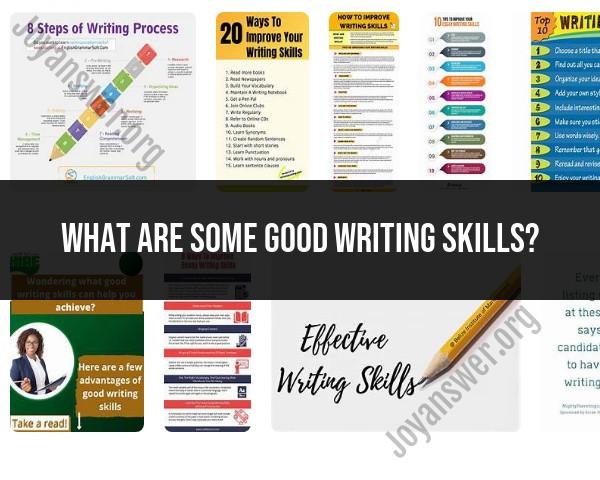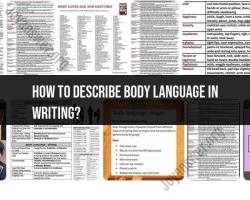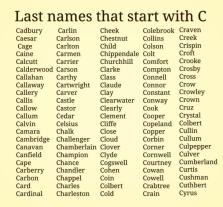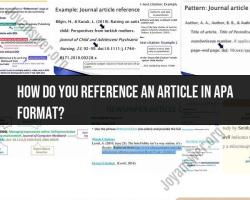What are some good writing skills?
Good writing skills encompass a range of competencies that contribute to effective communication and the creation of well-crafted and engaging content. Here are some essential writing skills:
Clarity:
- The ability to express ideas clearly and concisely is fundamental. A good writer ensures that their message is easily understood by the intended audience, avoiding unnecessary jargon or ambiguity.
Grammar and Punctuation:
- Strong grasp of grammar and punctuation rules is crucial for creating polished and professional writing. Proper sentence structure and punctuation enhance readability and comprehension.
Vocabulary:
- A rich and varied vocabulary allows writers to choose the most precise and impactful words for their content. It contributes to the nuance and tone of the writing.
Organization:
- Effective organization is key to presenting ideas logically and coherently. Writers should structure their content with a clear introduction, body, and conclusion, using appropriate headings and subheadings.
Sentence Structure:
- Varying sentence structures adds rhythm and flow to writing. Writers should be able to use a mix of sentence lengths and styles to keep the reader engaged.
Editing and Revision:
- The ability to review and revise one's work is crucial for refining ideas and improving clarity. Good writers understand the importance of multiple drafts and iterations.
Audience Awareness:
- Successful writers consider their audience and tailor their writing style to match the needs and expectations of their readers. They anticipate questions, provide relevant information, and engage the audience effectively.
Research Skills:
- Research skills are essential for gathering accurate and reliable information. Good writers know how to conduct research, cite sources appropriately, and integrate evidence to support their arguments.
Creativity:
- Creativity allows writers to think outside the box and bring fresh perspectives to their work. Whether writing fiction, non-fiction, or business content, a touch of creativity can make writing more engaging.
Adaptability:
- The ability to adapt writing style and tone to different genres, audiences, and purposes is a valuable skill. Writers who can switch between formal and informal tones or adjust their style for various platforms demonstrate versatility.
Critical Thinking:
- Good writers engage in critical thinking to analyze information, evaluate arguments, and present well-supported opinions. They consider different perspectives and anticipate counterarguments.
Attention to Detail:
- Attention to detail is crucial for catching errors, ensuring consistency, and maintaining a polished appearance. Good writers carefully proofread their work to deliver a professional final product.
Time Management:
- Writing often involves deadlines, and good writers know how to manage their time effectively. They plan and prioritize tasks to meet deadlines without sacrificing quality.
Emotional Intelligence:
- Emotional intelligence allows writers to connect with readers on a deeper level. Writers who understand and convey empathy, sensitivity, and emotional nuances can create more relatable and resonant content.
Adherence to Style Guides:
- Familiarity with and adherence to style guides, such as APA, MLA, or Chicago, is important for maintaining consistency and professionalism in writing.
These skills collectively contribute to the development of a competent and effective writer. Continuous practice, feedback, and a willingness to learn are key to honing these writing skills over time.
What constitutes effective writing skills?
Effective writing skills go beyond just grammatical correctness and extend to a multifaceted set of abilities that ensure your writing achieves its intended purpose and resonates with your audience. Here are some key elements of effective writing:
Clarity and Concision:
- Clarity: Present your ideas in a clear and understandable manner, avoiding ambiguity and jargon. Strive for direct communication that avoids unnecessary complexity.
- Concision: Be economical with your words. Use precise language and eliminate redundancy to deliver your message efficiently and avoid reader fatigue.
Structure and Organization:
- Logical Flow: Organize your thoughts in a logical sequence that guides the reader through your argument or narrative seamlessly. Use transitions and headings effectively to enhance clarity and flow.
- Cohesive Paragraphs: Each paragraph should focus on a single key point and contribute to the overall development of your ideas. Ensure clear transitions between paragraphs to maintain a strong narrative thread.
Engagement and Style:
- Voice and Tone: Develop your own unique voice that reflects your personality and purpose. Adjust your tone appropriately to suit the context and audience.
- Active Voice: Prioritize active voice constructions to make your writing more dynamic and engaging. This places the subject at the forefront of the action, making your message more impactful.
- Varied Sentence Structure: Avoid monotonous sentence patterns. Employ a mix of sentence lengths and structures to create a natural rhythm and flow in your writing.
Grammar and Mechanics:
- Correctness: While not the sole defining factor, proper grammar and punctuation are essential for professional and clear communication. Ensure your writing adheres to standard grammatical rules and conventions.
- Readability: Pay attention to sentence length and structure. Avoid overly long or convoluted sentences that might impede comprehension.
Additional Elements:
- Word Choice: Choose words that accurately and precisely convey your meaning. Opt for vivid and specific language to paint a clear picture in the reader's mind.
- Figurative Language: Use metaphors, similes, and other figures of speech sparingly and strategically to add emphasis and nuance to your writing.
- Editing and Proofreading: Revise and proofread your work meticulously to catch any errors in grammar, mechanics, or flow. Don't hesitate to seek feedback from others to ensure your writing is polished and error-free.
Remember, effective writing is an ongoing process that requires practice, refinement, and adaptation. By focusing on these key elements and honing your skills through consistent writing and revision, you can develop the ability to communicate your ideas effectively and confidently in any situation.













